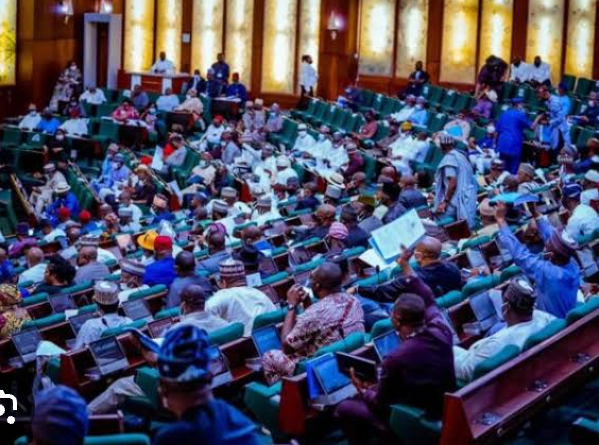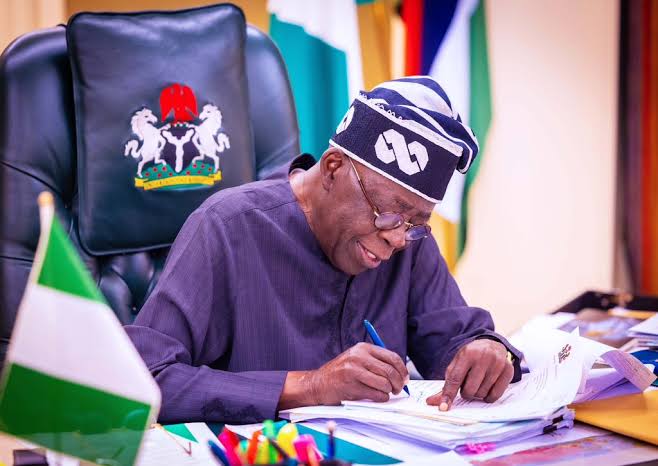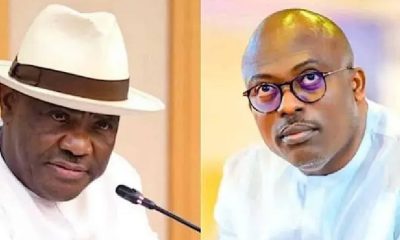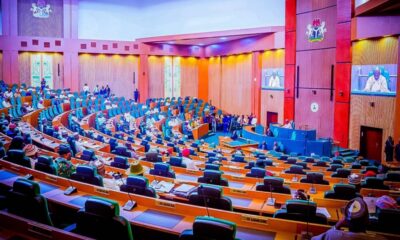News
Reactivated refineries : Obasanjo queries their capacities

Ex- Nigerian President Olusegun Obasanjo has made fresh assertions about the management of government-owned refineries in Nigeria, criticizing the Nigerian National Petroleum Corporation Limited (NNPCL) and raising concerns about its capacity to operate the refineries effectively.
In an interview with Channels Television, published on Thursday, Obasanjo questioned recent claims by President Bola Tinubu’s administration that the refineries have resumed operations.
He expressed skepticism, using a Yoruba proverb to emphasize that those who lie about their accomplishments will eventually be forced to confront the truth.
Shell’s Rejection and a Missed Opportunity
Obasanjo recalled his efforts during his presidency to involve Shell in managing the nation’s refineries. Despite his offer, Shell declined, citing concerns about the operational inefficiency and political challenges surrounding the facilities.
He also shed light on a missed opportunity in 2007 when billionaire businessman Aliko Dangote and his team offered $750 million to manage the Port Harcourt and Kaduna refineries under a Public-Private Partnership (PPP). Obasanjo negotiated the deal, only for his successor to reject it and refund Dangote’s investment. The rejection, according to Obasanjo, was based on assurances from the NNPCL that it could handle the refineries. However, Obasanjo firmly asserted that the corporation lacked the expertise and capacity to fulfill such promises.
Despite his criticism of the NNPCL, Obasanjo expressed faith in Dangote’s ability to manage the privately owned Dangote Refinery in Lagos. Highlighting Dangote’s track record as an entrepreneur, Obasanjo noted that private sector-led initiatives are often more efficient and less burdened by bureaucratic challenges than government-run enterprises.
Refineries and Nigeria’s Oil Sector
Obasanjo’s remarks reignite longstanding debates about the effectiveness of Nigeria’s approach to managing its oil sector. Many observers argue that government-owned refineries have struggled due to poor maintenance, mismanagement, and corruption. While privatization and public-private partnerships have been proposed as solutions, successive administrations have often resisted such measures, citing concerns over national sovereignty and control.
The Bigger Picture
Obasanjo’s criticism comes at a time when Nigerians are grappling with high fuel prices and economic challenges. His statements could further fuel discussions on the need for structural reforms in the oil and gas sector. Meanwhile, the success of the Dangote Refinery, expected to be a game-changer for Nigeria’s refining capacity, may serve as a benchmark for what private sector participation can achieve.
This candid reflection by the former president underscores the importance of leadership, transparency, and innovation in addressing Nigeria’s long-standing energy challenges.
News
Enugu Reps PDP Caucus Welcomes LP Members To Its Fold

Members of the Enugu State Caucus of Peoples Democratic Party, ( PDP) in the House of Representatives, Rt. Hon. Nnolim Nnaji , Rt. Hon. Martins Oke and Hon Anayo Onwuegbu have welcomed Rt. Hon. Dennis Agbo and Hon. Chidi Mark Obeta of Labour Party, (LP) to the PDP fold.
They observed that the visionary leadership of Dr Peter Ndubuisi Mba in Enugu State has ignited massive decamps and unprecedented upsurge of membership of the Peoples Democratic Party, (PDP) in the state.
The caucus in a statement issued after the two members of the House of Representatives, Rt. Hon Dennis Agbo of Igboeze North/ Udenu and Chidi Mark Obeta who represents Nsukka/Igboeze South formally announced their transfer of membership to PDP at the resumption of House plenary on Tuesday said it was gladdening to receive them into the PDP fold.
They stressed that PDP in Enugu State was witnessing a great rebirth as a result of the transformative development agenda being unleashed in various sectors of the economy of the state by Governor Mba which has received global commendations.
The Enugu State caucus Leader, Rt. Hon. Nnolim Nnaji on behalf of the members further noted that Governor Mba’s investments in infrastructure, agro economy, and security among others have made Enugu State a tourist’s haven adding that with the good governance structure he has put in place, his second tenure would be a walkover.
News
2025 budget: Tinubu Seeks NASS Approval For N1.784trn FCT Statutory Budget

News
Finally , DTHA becomes one party assembly as Speaker, 21 other PDP members defect to APC

Speaker of the Delta State House of Assembly, Rt. Hon. Emomotimi Guwor, along with twenty-one other former members of the Peoples Democratic Party (PDP), elected into the Assembly has officially defected to the All Progressives Congress (APC), following a major realignment of political stakeholders across the state.
The defection of the twenty-two lawmakers has effectively transformed the Delta State House of Assembly into a one-party legislature, as the remaining seven members were originally elected on the ticket of the APC.
Announcing the development on Tuesday during the resumption of plenary after the Easter break, the Speaker stated that the decision was the result of extensive consultations with their constituents and political leaders throughout the state.
He emphasized that the move aligned with Section 109 of the 1999 Constitution, as amended.
While expressing appreciation to members for their contributions so far, Guwor urged the House to ensure the completion of all pending bills as the second legislative session nears its end.
He noted that the political shift towards the APC was in response to the realignment of stakeholders and the desire to align with the Federal Government under President Bola Tinubu’s leadership.
“The mass defection of members of the Peoples Democratic Party, led by Governor Sheriff Oborevwori, to the All Progressives Congress was made in the overall interest of Deltans and the state,” the Speaker said.
He explained that the decision followed extensive consultations held on April 23 and which cumulated on the official reception on April 28, 2025, at the Government House and the Cenotaph, respectively.
He said: “We are fully committed to partnering with the Federal Government to deliver greater development to Deltans.
“On behalf of the House, I commend the courage and visionary leadership of our Governor, Rt. Hon. Sheriff Oborevwori, in making this strategic and timely decision.
“As a legislative body, we stand with His Excellency in this endeavour. This renewed partnership between the state and Federal Government must be supported and allowed to flourish, so that we can begin to enjoy its benefits in the shortest possible time.”
He informed the House that he had received twenty-two letters (including his own) notifying of the change of party affiliation from the PDP to the APC.
The defection, he said, was driven by instability within the PDP’s national leadership and factional divisions within the South-South Zonal Executive Committee, leading to internal conflicts and disunity within the party.
Citing Section 109(1)(g) of the Constitution of the Federal Republic of Nigeria, 1999 (as amended), the Speaker affirmed the constitutional basis for the defection.
“With this action, the Delta State House of Assembly is now composed entirely of members from the All Progressives Congress. We thank our constituents for endorsing this progressive course of action”.
A motion to adopt the letters of party change was moved by the Majority Leader, Hon. Emeka Nwaobi, and seconded by Hon. Ferguson Onwo, who represents Isoko South II.
Speaking to journalists after the plenary, the Majority Leader, Hon Emeka Nwaobi reiterated that the defection was prompted by the crisis within the PDP.
“Our decision was based on the instability at the national level and the factionalization at the South-South level. Consequently, we chose to move to the ruling All Progressives Congress, in accordance with Section 109 of the 1999 Constitution, as amended,” he said.
-

 Opinion13 hours ago
Opinion13 hours agoRIVERS, WIKE, FUBARA, AND THE WAY FORWARD
-

 Politics12 hours ago
Politics12 hours agoJust in: Delta PDP Reps members defect to APC
-

 News23 hours ago
News23 hours agoFULL STEPS: How to check 2025 JAMB results
-

 News23 hours ago
News23 hours agoMinistry denies awarding N13bn contracts without due process
-

 News17 hours ago
News17 hours agoVDM may be released on Tuesday
-

 News11 hours ago
News11 hours agoTension As Lawmakers Warns of Public Revolt Over Insecurity
-

 News14 hours ago
News14 hours agoNANS Barricades Lagos-Ibadan Expressway Over Alleged NELFUND Mismanagement
-

 News14 hours ago
News14 hours agoCourt bans Nnamdi Kanu’s in-law from 3 proceedings over live streaming

















